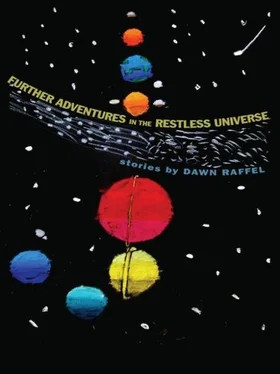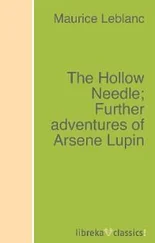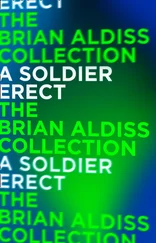4. Sugar Pops — dinner — in the seventh floor walkup I share with a roommate on Thompson Street, so small that it never takes more than one ring to answer the phone (except I rarely do), before heading out with girls I know — transplanted Midwesterners, girls in search of something, or anything, too easy to impress — to a place we know in Soho. We can’t afford to drink, but someone always pays for us — at least, that’s what we tell ourselves. I’m wearing a delicate lavender dress that’s somehow ridiculous the minute we walk in the door. It’s a cavernous place, six deep to the bar. This time I sit on the floor before losing consciousness. When I come to on the sidewalk, the bouncer who carried me out wants my friends to tell him what I took. I think I’ve been out for hours; it feels like a hole in the night. “You’d better tell the truth,” he says. Cab home — can’t afford it. I never wear the dress again.
5. Eight months gone, I make a last trip home to see my mother, my father, places I grew up. Did I mention my father? He lives way down the lake. I want everything to be the way it was before I left.
The baby is kicking; perhaps he’s upside down.
Leaving again, it’s an hour to the airport in Milwaukee, so my father and I are up and out before the sun. He says he doesn’t mind, but he’s dark around the eyes. His hands are liver-spotted on the wheel. My father likes to talk about astronomy and molecules, the nature of the firmament (the infinite, he says, is in the infinitesimal), small product manufacturing (he’s patented a chair designed to trigger certain brain waves), Latin music, ballroom dancing, quantum physics, aeronautics, aging. “I believe,” he says, “we could extend the human life span, maybe by at least 100 years. ” He is eating in the car — a banana, pills. “ Want some?” he says.
The plane reeks of sauce. The food cart is coming… and two women are wavering above me with an oxygen tank. They’re flight attendants, uniformed. One says I had a seizure. “ You made a noise, ” she says. The other says I need to eat right now, have this plastic tray of breakfast, which is orange juice — fine — and airline crepes in cream. I eat a few bites and start vomiting profusely. I need a second bag, a third, can’t make it down the aisle to the bathroom. There’s nothing but fluid. The baby isn’t kicking. The man from Racine in the seat next to mine, having given me his bag, is at a loss. “I’m sorry,” I say. “I’m so sorry,” I say. “Air traffic”—it’s the flight attendant back again, the grave one—“The captain—” What is she saying? “Could you please get ahold of yourself?” she says.
Forty minutes early, we’re at LaGuardia, as if there were a secret route through distance and time. Some people seem annoyed by time to kill. The paramedics take me off, cuff my arm. My blood pressure alarms them. “Look at this,” says one to the other. “Will you look?” There are two of everyone today, it seems. They want to take me to Jamaica hospital; I insist on going to a pay phone (my dime). The paramedics make me sign a waiver stating that I’m knowingly ignoring their advice.
By the time I get to my doctor, 20 minutes later, the baby is active. We listen to the heartbeat. “You’re fine,” my doctor says. “Go home and eat starch.” I call my husband, who goes out to buy crackers.
When I call my dad, I say my flight arrived the better part of an hour early. “Really,” he says. “That never happens to me.”
6. Labor room. Everyone is leaving. The nurse slips out; my doctor, who is pregnant (what a sight we must be!) takes a swollen ankle break, and my husband — we’ve done this before — is buying something for a headache. My father’s parents, who are dead, come into the room together. Everything is fine with them. The baby is fine, fine, fine. I am very happy. A woman is screaming. Something is slapped on my face and I open my eyes and I’m under an oxygen mask. “Delivery!” the woman says. My husband’s face appears. I’m lifted, heaved and wheeled. “Is there oxygen in there?” my doctor keeps asking. My grandparents — people are yelling at me. “Push! Push-push!” There’s a whole crowd in here. Someone checks the plastic mask I’m pushing off my face. I feel the baby leaving me. They take away the baby. Then they bring the baby back, and then he looks at me and takes my breast, and then they take him away again.
I am on the phone, leaving messages for everyone. No one is home. Later a doctor enters my room and tells me not to worry; he’s checked the baby over and the baby is fine. “Why wouldn’t he be?” I ask. The doctor wants to know if I remember him — the whole team, with the crash cart. I shake my head no.
7. Tetanus shot — preventative; why wait for a rusty nail? (“ Do you know what lockjaw looks like?” my mother used to say.) I pay my co-pay and collapse. Women in the waiting room are swooning over me. It was quicker than I think, they say, of shorter duration, this blackout or spell. I thought that I was home, in a room that is gone, and also somehow in motion. The receptionist is speaking with a certain irritation. “Your patient—” she says to the intercom system. She makes me eat a cracker, two crackers from somewhere, left over from lunch. “I don’t like this,” my doctor says, reading a meter. She won’t let me look. When she lets me stand, I can’t make it to the door.
The doctor calls at night. She wants to talk to me; she is talking to me about things that end in “noma.” I fire her.
I get worked up. Knock on wood. No noma, the endocrinologist says. He has a name for my condition, which I make him repeat. It escapes me again.
The babies have birthdays. My grandfather appears in a dream where he’s carrying the body of a man I can’t identify. My father sits down swiftly, surprisingly gracefully, witnesses say, while dancing, and never gets back up. When I call the house, I get his voice on the machine but the body is elsewhere, in storage, is ash.
There are no more spells. I am learning things, like when to keep my head down and the uses of salt.
“Which would you rather be?” she says. “A rock or an insect?”
“Rock,” he says. He is pressing his face to the glass again.
“Why?” she says.
“Rock crushes insect.”
“What if the insect’s huge?” she says.
The boy turns. The bus stops. “Huge,” he says. He pushes his face against her chest. “Until it meets the rock.”

“Not our stop,” she says.
Winter is on them, ice on the trees. Roads have been salted.
The boy’s pale skin is damp from the window. His skin is like hers.
“I know that,” he says, and sits back down.

His breath on the glass is the matter through which she views the world. It is late afternoon; the heat too high, the sky about to darken.
Her ankles are swollen, belly, her breasts.
“Smarty,” she says. She loosens his scarf. She crawls her fingers up his neck. So soft, the boy! “ Then where did you think you were going, you?”

“A sister or brother?”
“Silly,” she’d said. “ You will be a brother.”

A snapshot she keeps on the mantel at home. Look at her: the size the boy is now. Afraid of her shadow. Clearly it is afternoon, the light in a slant.
She was posed on a boulder for added height.
Читать дальше












